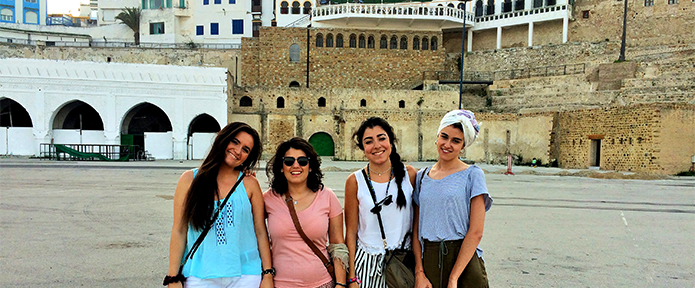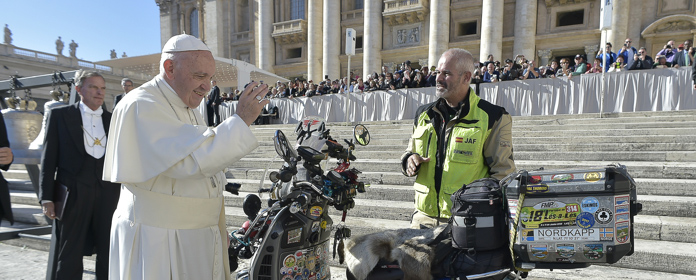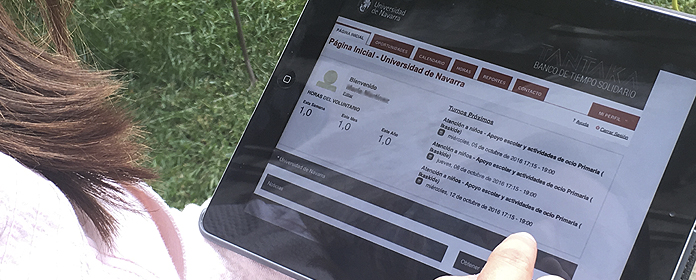<i>Educating on Global Health</i>: el proyecto solidario en Tánger de 8 estudiantes de Bioquímica y Farmacia
The students of the University of Navarra, coordinated by the high school of Tropical Health, have elaborated a guide on hygiene and health habits.

A group of eight students from the University of Pharmacy and Biochemistry from the University of Navarra have dedicated part of their summer to a cooperativeproject called Educating on Global Healthaimed at improving health and hygiene Education for children in developing countries development.
The project arose at the beginning of the last academic year, when some of the students involved were taking the 2nd year Pharmacy course subject "Challenges and Progress in International Health". At class , Dr. Paul Nguewa, director of high school of Tropical Health of the academic center, raised the possibility of developing a project through which they would collaborate with high school but not as scientists, but rather internship, in the field.
Finally, eight students -JavierMelchor, María Fernández, Manuel Rouco, María González, Ainhoa Garayo and Paula Martínez de Aguirre, Patricia Oficialdegui and Arantxa Huarriz from Navarre- got involved with project and started fundraising to publish a guide on hygiene habits for children.
As one of the students, Paula Martínez de Aguirre, recalls, "the Schools of Science and Pharmacy helped us raise funds at the Open Doors conference and in the previews. We also did promotion on Instagram with the account @educatingongh and with the proceeds we were able to print the booklet, buy toothbrushes and toothpaste, as well as the paints that went with the booklets," says the 4th year Pharmacy student.
The ISTUN researchers, for their part, gave them support in developing the contents of the small guide: "They helped us choose the most effective illustrations and edit them for people from other cultures, and also financed part of the booklet, which we printed with New Ink, since they made a more affordable budget ," adds the student.
Effetah's childrenThis project -which its first members hope to continue with new students next year-, was finally developed in different institutions of financial aid and cooperation in Tangier (Morocco). "We traveled in two batches. Once in the city, for a week our mission statement consisted of working with this guide with the children of the Missionaries of Charity, the Brothers of the White Cross or the Franciscan Missionary Sisters, as well as with any other activity in which we were useful", adds Paula.
"For example, we helped the Sisters of Charity in the nursery and in the kitchen, or with housework. And to the brothers of the White Cross, we lend a hand in caring for the disabled people they have at position. At Effetah, a high school for deaf-mute children, we focused on explaining the booklets to them so that they could assimilate the health and hygiene measures staff that we proposed," explains Javier Melchor, a 4th year student at Biochemistry ."The main goal ," concludes Arantxa Huarriz, also a 4th grade student at Biochemistry ,"was for the children to learn, in a fun way, the importance of hygiene in health, brushing their teeth, cleaning the fruit before eating it, etc. All this through play, painting, and with health messages that everyone can apply to themselves, as these are very simple and effective hygiene measures staff ".
<i>Sukram</i>: graciasFor Maria Gonzalez (2nd year Pharmacy + IPC) this project can be summarized in one word: sukram, which means thank you in Arabic. "Besides being one of the first words we learned, I think it captures the spirit of this project and how grateful everyone was in Tangier, even though we were just helping them move some boxes... That gratitude made us feel a great gratitude for this trip and this project, which I would love to repeat," stresses the student.
Ainhoa Garayo (2nd Pharmacy + IPC) explains that after the preparation of project, which took several months, the trip to Tangier was the finishing touch: "I was impressed with the different Moroccan cultures, whose problems we were able to learn about from the inside through the work of different organizations, such as the Missionaries of Charity. Getting close to the underprivileged in this way not only helped them, but also greatly enriched us. It brought us closer to our inner selves and made us grow," she stresses.
The same idea is shared by Patricia Oficialdegui (2nd Pharmacy + IPC), who adds to all this "the work as a team, where you learn to accept different ways of performing the tasks, and all the love that we were given in the city, the children themselves or their mothers. And learning to be grateful for everything we have...".



